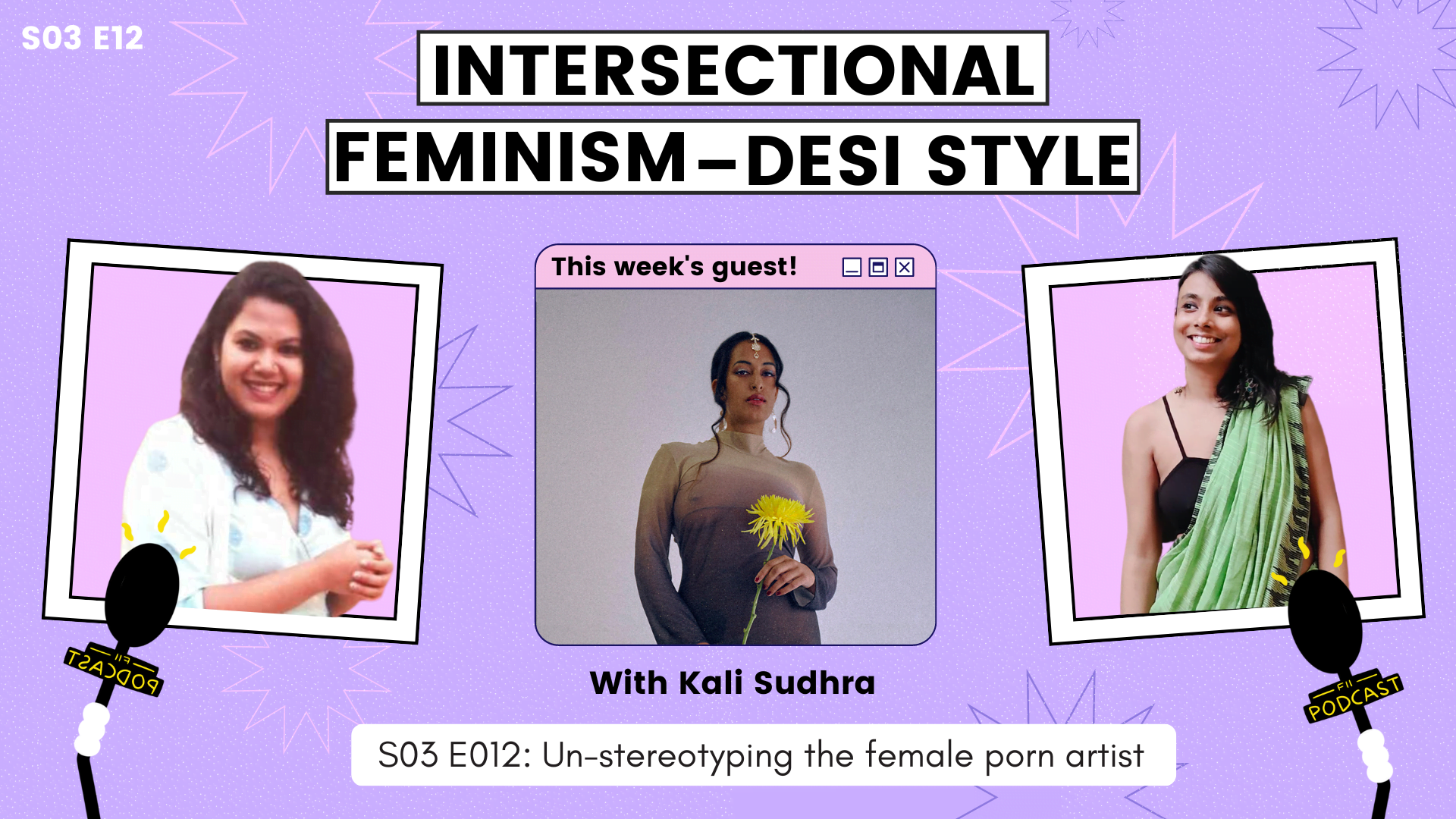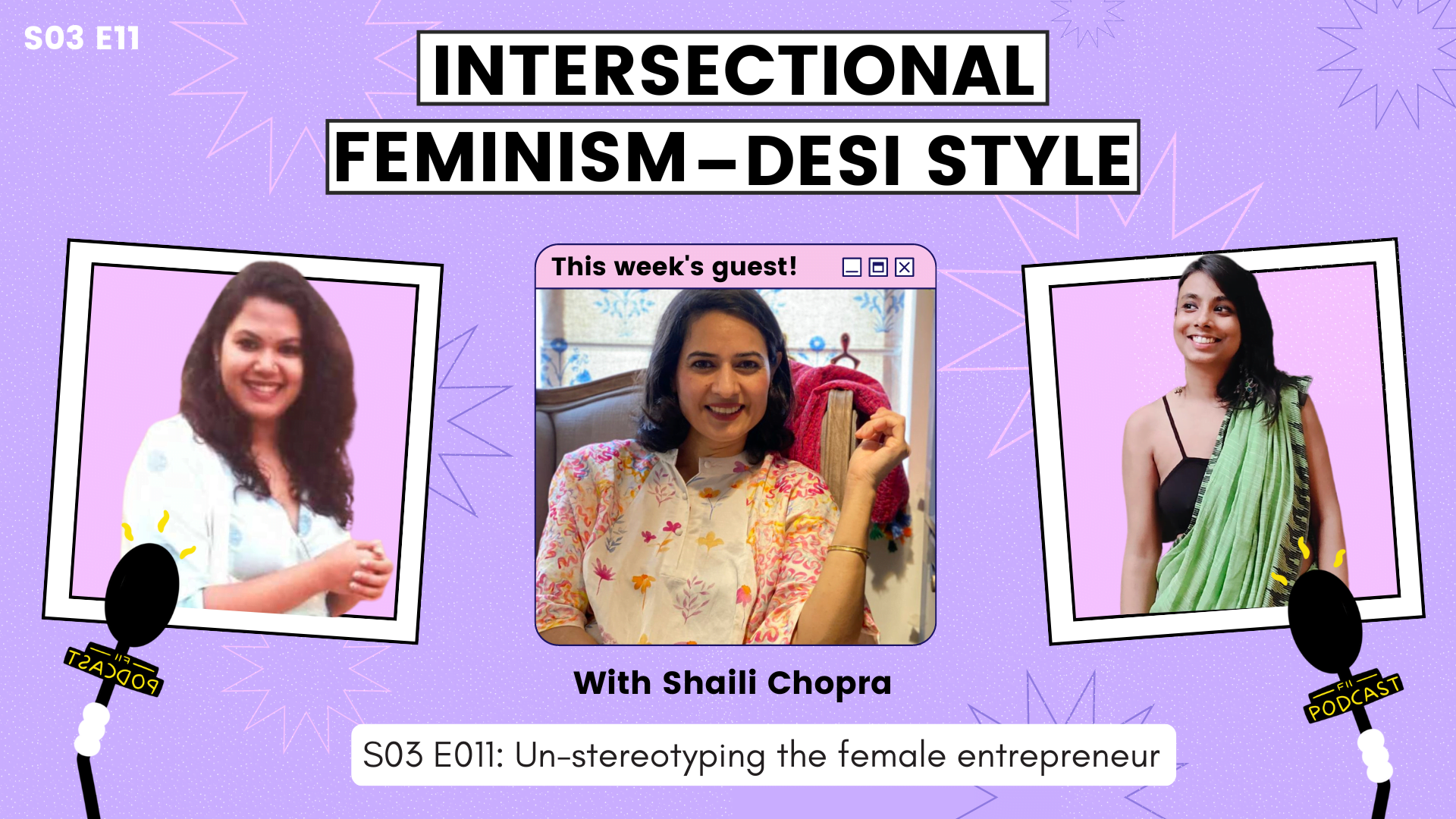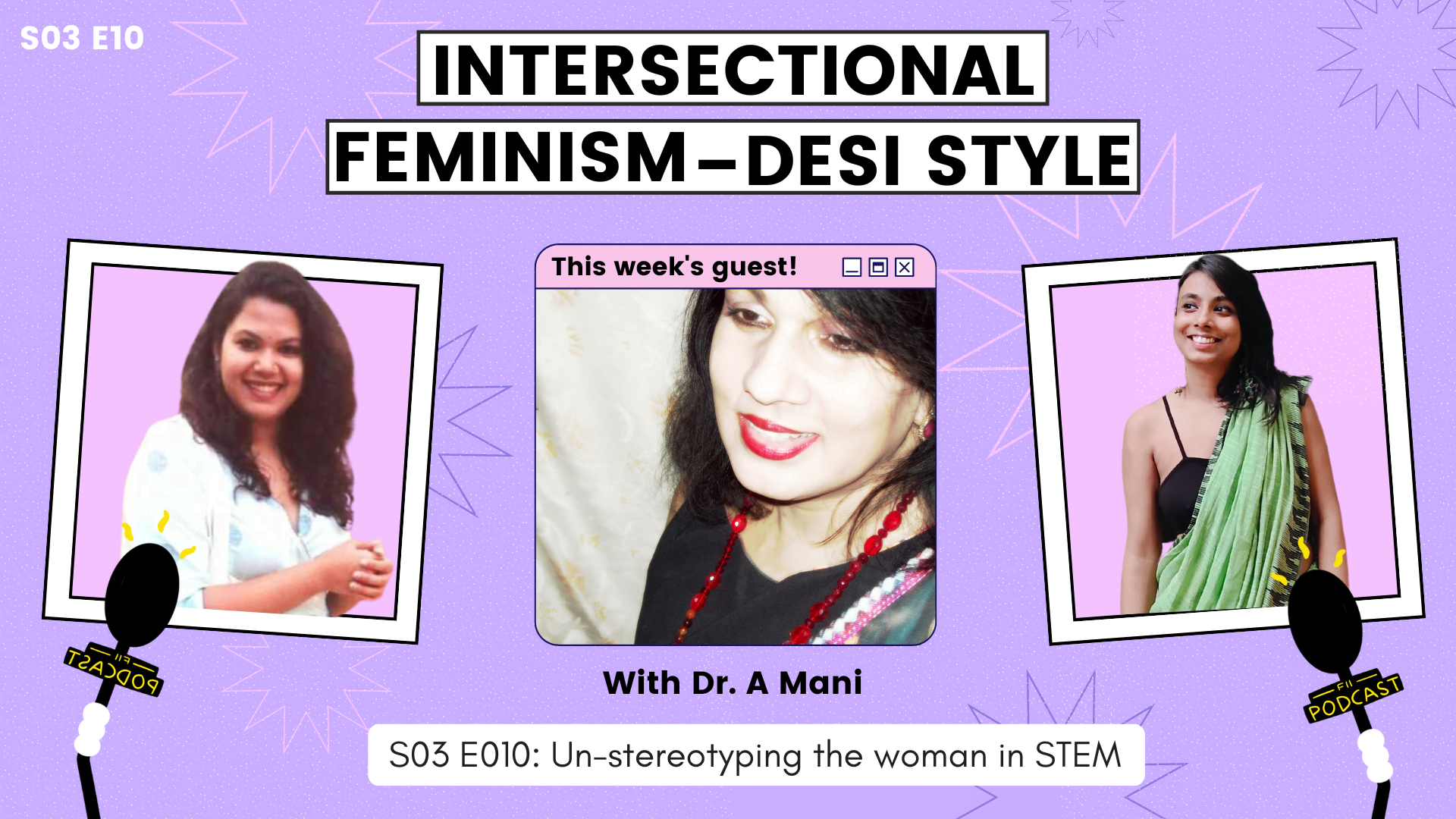Advocacy, Leadership, Initiating Change, Peacebuilding. At the onset, these might seem like heavy words with which is attached a lot of responsibility. And often what we expect to see is immediate tangible changes. While yes, it is true that civil society advocates, leaders, changemakers, and peacebuilders do have an immense responsibility to fight against social injustices, movements and fight for justice is not a smooth sailing track for those involved and does not always come with a clear set time frame. It is a process that takes place over decades and years of effort and passion.
‘Advocacy, Passion & Beyond: Voices from the SI Leader Lab’, a podcast by Feminism in India in collaboration with the Swedish Institute, was conceptualised with this very thought in mind, to explore and understand how the little nuances and ways in which individuals involved in the change-making process, advocates of social justice across the world have taken on the challenge and have used digital tools to continue doing the work they do, especially on the heels of the devastating Covid-19 pandemic.
In the course of the four-episode podcast, we spoke to civil society members, activists, leaders across Eastern Europe, South Asia, and the MENA region who are alumni of the SI Leader Lab leadership programme, to understand the challenges they have faced in the past years and how they have worked around the limitations to continue their work for the Sustainable Development Goals.
The very aim of the podcast has been to recognise and better engage with the journeys, stories of resilience, and ideas of social leaders and changemakers from across the world and apply those ideas to create more effective advocacy, and digital advocacy tools, especially keeping in mind the importance of online community building in times of global crisis like the pandemic.
The podcast was conceptualised by SI Leader Lab program manager, Ulrika Engström and hosted by Japleen Pasricha, the founder-CEO of Feminism in India. She is also a Swedish Institute alumnus herself.
With the aim of creating a network of solidarities and resources for not just the previous batches of leaders who have been part of the SI programs, but also for future generations to come, the guests included Swedish institute alumni across several years.
With the aim of creating a network of solidarities and resources for not just the previous batches of leaders who have been part of the SI programs, but also for future generations to come, the guests included Swedish institute alumni across several years. The themes for each episode were structured around different aspects of the activism and advocacy landscape, ranging from the challenges and issues that those involved in the process face to the solutions that they devise to change the flawed systems. The episodes give a good insight into how activism and the fight against social inequalities take place across physical borders, in different parts of the world.
The first episode of the podcast talked about how powerful stories can mobilise and create change. The episode delved into questions about what it takes to shape narratives and create campaigns that inspire cultural, behavioural, and policy change. The episode also talked about examples of successful and innovative campaigns focusing on marginalised groups from different regions and addressed some very common mistakes that can happen while campaigning.
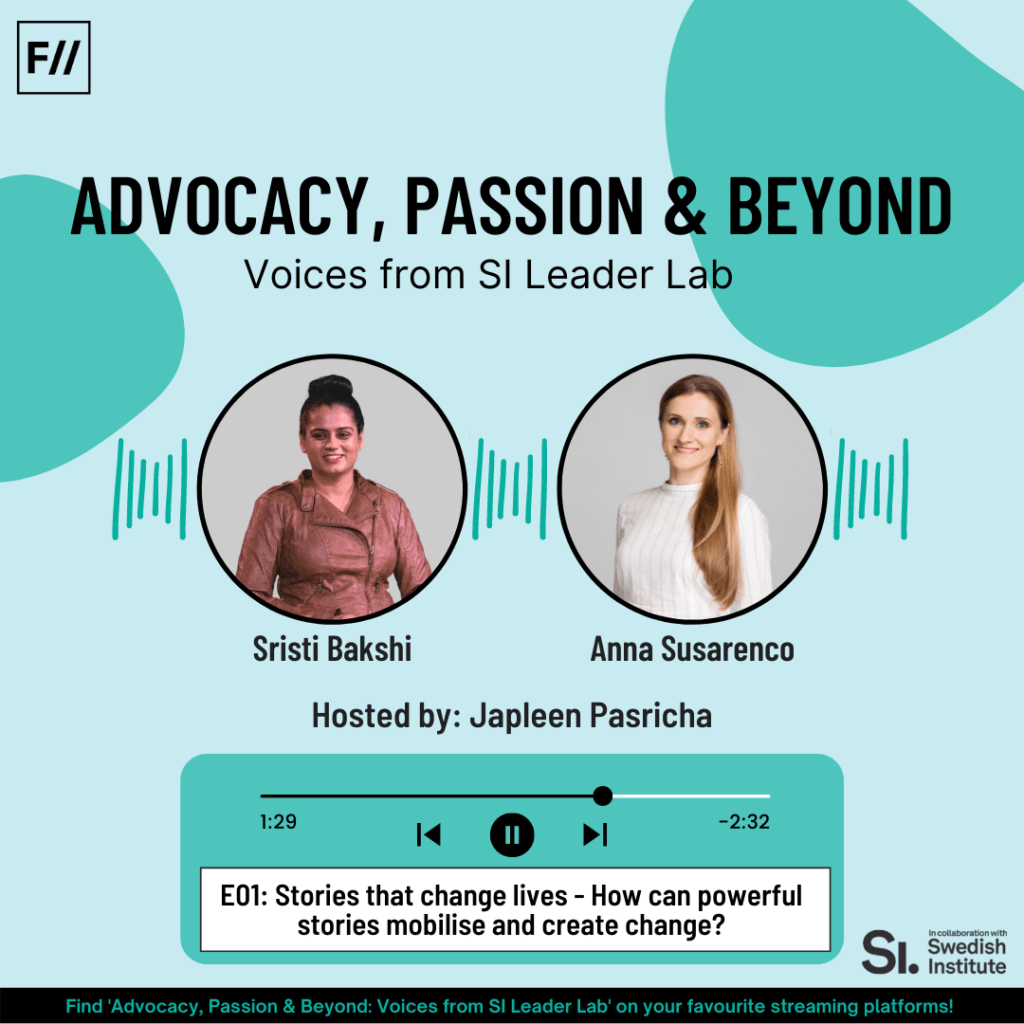
For this episode, the guests included Anna Susarenco from Moldova and Srishti Bakshi from India. Anna is a consultant on Global Citizenship Education and advocacy at UNESCO. She founded one of the largest youth peer-to-peer education networks in Moldova, did community organizing, and adult civic education, and organized several Get Out The Vote campaigns. From 2009-2016, Anna represented youth voice at United Nations in Moldova and at the international level. She is also the Founder of the #EducationforAll initiative aiming to help young people to become active leaders and citizens.
Srishti Bakshi, a marketer-turned-women’s-rights-activist, embarked on an on-foot journey of 3,800 kilometres across India, not only to put a spotlight on the causes of violence against women but also to empower women by conducting over 100 workshops focused on women’s safety and encouraging them to be financially independent. After meeting more than 100,000 women on her epic on-foot journey, she created a documentary film, revealing untold stories of courage, WOMB: Women Of My Billion. Since the launch of WOMB in 2021, the documentary film has been featured in over 15 prestigious international film festivals across four continents and has won 11 audience choice awards. She now directly engages with grassroots initiatives that advance resilient livelihoods for women.
In the course of the conversation, Japleen, Anna and Srishti touched on several topics starting from how to design meaningful campaigns, how important is the network for activists to how important is digital advocacy in this day and age.
In the course of the conversation, Japleen, Anna and Srishti touched on several topics starting from how to design meaningful campaigns, how important is the network for activists to how important is digital advocacy in this day and age. Speaking about the same Anna says, “Covid provided us, activists, with a good opportunity to understand and work on digital advocacy and do better. It was also a very important time for people to understand the importance of network and networking.” The conversation also focused on access to digital literacy by survivors of violence, something that Srishti has worked on. She says, “When it comes to digital literacy, I feel that for all women who are suffering the violence if they could be spoken to about digital access, it can make their difficult journeys less isolated.”
Moving to the second episode, the discussion revolved around another very important aspect of advocacy and activism—countering gender-based disinformation and understanding its extreme importance in the functioning of a democracy. To discuss this topic, we had Noura Aljizawi from Syria and Hira Amjad from Pakistan.
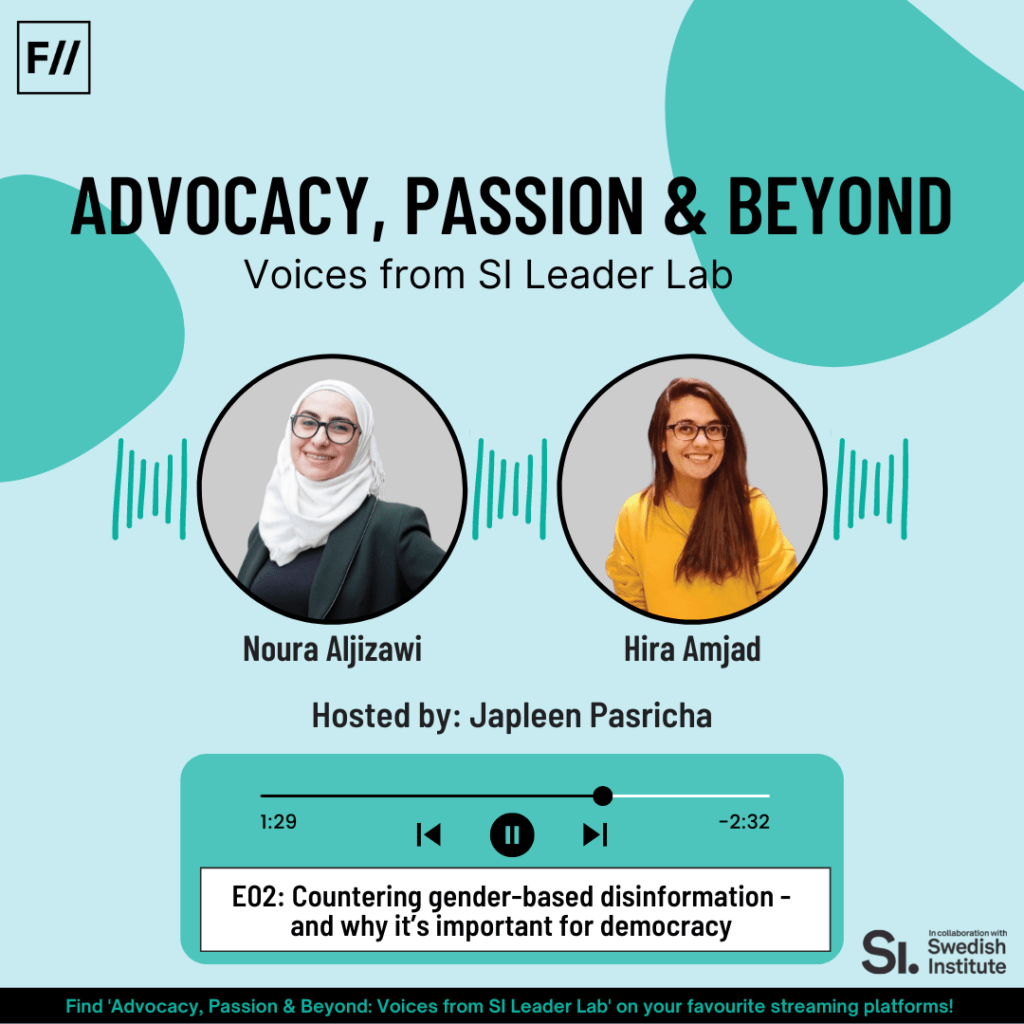
Noura is a researcher at the Citizen Lab at the Munk School of Global Affairs and Public Policy, University of Toronto. Her work takes an in-depth look at digital transnational repression, digital authoritarianism, human rights, and digital surveillance more broadly. She is also the Chairwoman of Start Point, a nonprofit organisation that works on human rights and gender in the course of the conflict in Syria. She also sits on Amnesty International‘s steering committee of Just Tech And Migration Community, and on the advisory board of the Humanitarian Dialogue HD of conflict and disinformation program.
Hira is the Co-Founder and Executive Director, of the DASTAK Foundation. She has been working to eradicate gender-based violence and to promote women’s rights across Pakistan since 2014. She specialises in the development and execution of grassroots-level community engagement, awareness raising, and social mobilisation projects. Hira has worked with women and young girls across Pakistan, including those residing in various districts of former war-torn Federally Administered Tribal Areas (FATA) on projects supported by the US Embassy, British High Commission, USIP, UNDP etc. She was awarded the Human Rights Award by Geneva in 2021 for her work through initiatives such as Waseela and TABEER Network.
The episode discussed and shed light on what happens to our civil and political life when women and marginalised groups are leaving online spaces because many platforms continue to become increasingly conflicted spaces.
The conversations in this episode centred around gender-based disinformation as an everyday reality of women and marginalised individuals. The episode discussed and shed light on what happens to our civil and political life when women and marginalised groups are leaving online spaces because many platforms continue to become increasingly conflicted spaces. “It is absolutely an attack on democracy, and it is not random. One can easily find the inauthentic codes and behaviour,” says Noura while talking about disinformation campaigns.
The discussion also circled around various strategies that can make online spaces more accessible and safer for women and other gender minorities and ways to tackle various disinformation campaigns. “Gender-based discrimination is targeted, systematic, and planned. I have seen cases, where women have been targeted, with strategically designed campaigns from various platforms and profiles. This makes the work that we are doing—to create online spaces—very difficult,” Hira added. Hira also spoke about the trolling and disinformation campaign that she and her organisation had faced online and how they built back from there, which is very important- building back stronger.
In the third episode, the focus of the conversation shifted to talking about the mental health aspect of activists and changemakers, surviving with passion and creating resilience. Questions like, how does one take care of themselves when working with vulnerable groups? How important is it for activists to focus on mental health when working on the field and campaigns for social change? How can one create resilience and healthy, sustainable human-centred organisations? were dealt with one by one. The guests, Sonal Dhanani from Pakistan and Nesmah Mansoor from Yemen, are leaders, peacebuilers and mental health advocates at their respective workspaces.
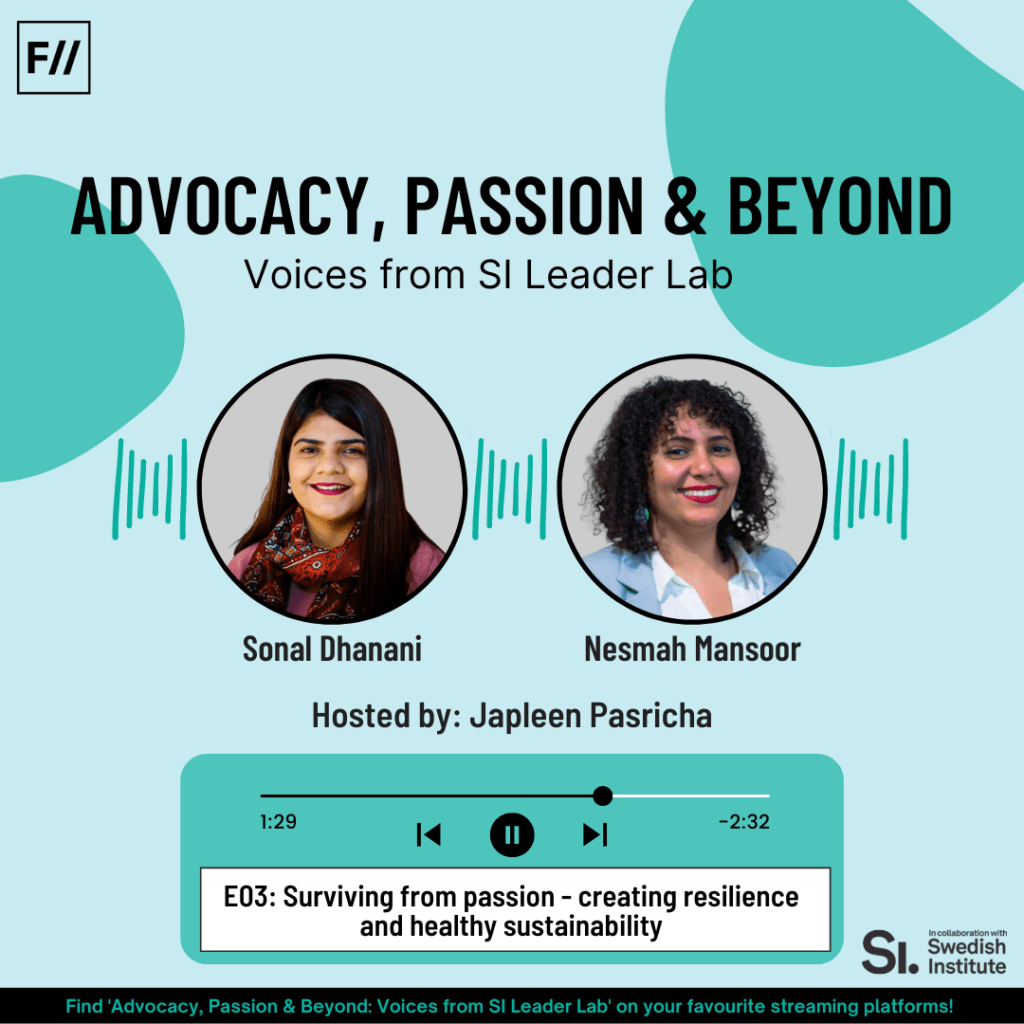
Sonal Dhanani is an award-winning women peace builder, mental health advocate, creative professional, Neuro-Linguistic Programming (NLP) practitioner, and trauma-informed facilitator keen on promoting education, mental health initiatives, and social action in Pakistan. Sonal was a member of Pakistan’s first National Youth Council by Prime Minister Imran Khan. In 2015, after losing a loved one in a terrorist attack; Sonal realised the need for mental health and recreational well-being in Pakistan and started an initiative called Parindey which focuses on countering and preventing violent extremism in Pakistan through the soft approach of introducing mental health and peacebuilding programs. Through this organisation, Sonal is participating in the mainstream process of peace at the people-to-people level.
Nesmah is a Youth Human Rights Defender and Peace Activist. She has more than 8 years of experience in human rights, including women and youth rights. She is also the founding member of the Peace Track Initiative and is currently the Media and Advocacy Officer.
Both Nesmah and Sonal spoke at length about their own challenges in dealing with mental health while also doing the very important work that they do.
Both Nesmah and Sonal spoke at length about their own challenges in dealing with mental health while also doing the very important work that they do. Nesmah stressed the importance of self-care. “We cannot say that we advocate for peace while deep inside us we have so much hatred and resentment towards other people. So, taking care of your mental health also helps you find your inner peace and help others in a much better way,”
Nesmah adds. While Sonal spoke about her work with survivors of gender-based violence, and how she helps them process their trauma. “When people go through such deeply traumatic experiences, they hold a lot of trauma within them. There is a lot of anger. Not everyone wants to take revenge, but positivity is questioned. Negative thoughts overpower everything. I started using art and therapy to help these people channelise their emotions and hold space for them,” says Sonal.
The fourth and final episode of this podcast dealt with the critical question of building back stronger, better, and with passion for changing minds and ultimately changing systems. This episode raised some very important questions on how to create real transformation and systemic change through campaigning. And how have these campaigns, advocacy, and activism changed during the pandemic? Sara El Outa from Lebanon and Ahmed Ben Nejma from Tunisia joined host Japleen to share their insights about systemic change in their respective countries, and what drove the change.
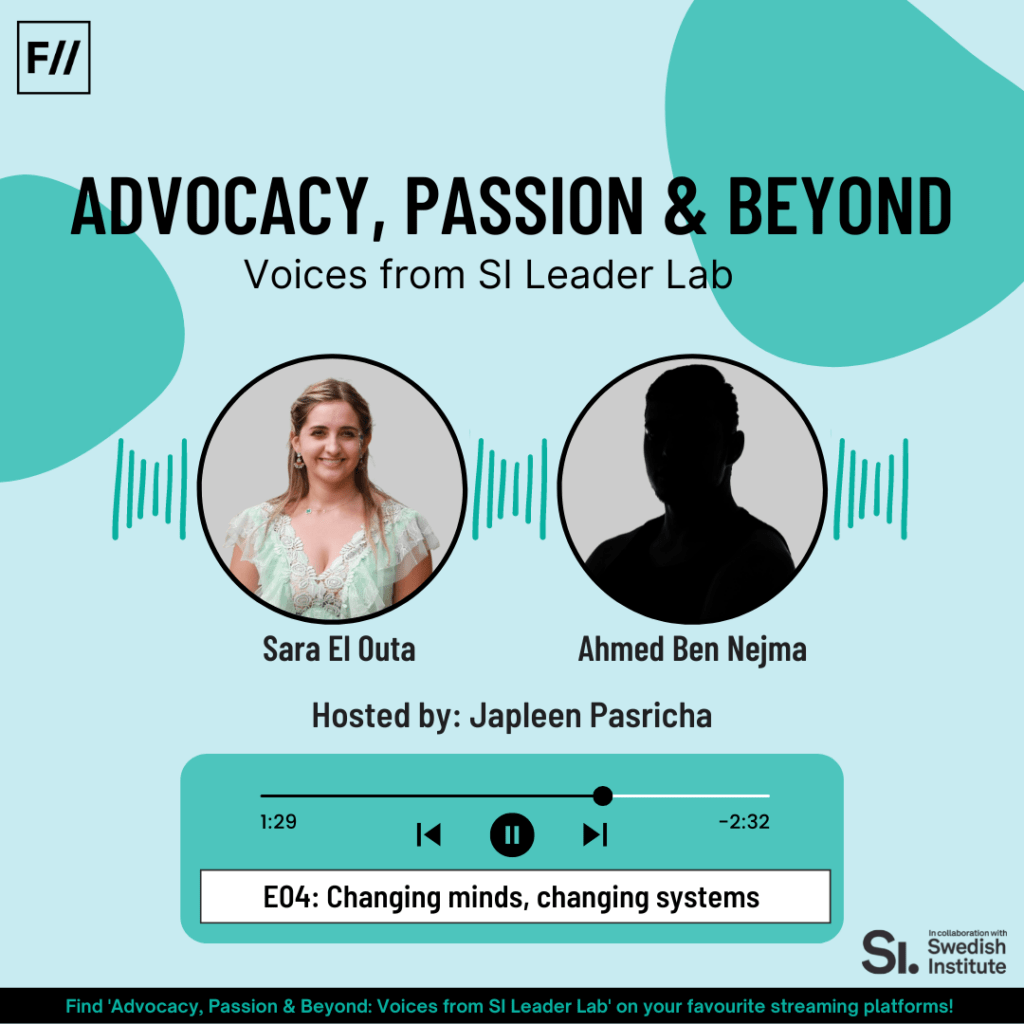
Sara is a feminist, civil activist, and human rights defender. She is currently working as a Gender and Inclusion Technical Advisor at ASMAE and used to work as a Project Coordinator at Plan International Lebanon for the She Leads Programme. She was elected as a board member of the Lebanese Women Democratic Gathering – RDFL. Ahmed is a Tunisian civil society expert, who worked with national and international NGOs on different topics during the last 10 years.
The episode largely focused on the message that systemic changes do not happen in a day. It is a long-standing process that takes place bit by bit, over years and decades. As host Japleen Pasricha says, “It is very important for civil society defenders and activists to keep the campaigning alive because we never know when regressive forces can make a comeback.”
While the podcast was about understanding and learning different ways of advocacy, activism, and peacebuilding, creating and sharing new tools of digital advocacy, it was also about sharing stories of change, of hope, of solidarity. It was about creating a sense of camaraderie, to tell everyone fighting for the cause, that you are not alone. While the fight may become isolated at times, this podcast is a reminder that we are all part of a community—a community striving to fight and heal.
Listen to the podcast on Spotify, Google, Apple Podcast, Anchor and all other major podcast streaming platforms.
About the author(s)
Shriya is a former student of literature and a multimedia journalist with an interest in sports and human rights. She can be found watching Shah Rukh Khan movies or listening to Ali Sethi and 90s Bollywood songs. She enjoys a good cup of black coffee multiple times a day and is often compared to 'Casper, the friendly ghost'.

